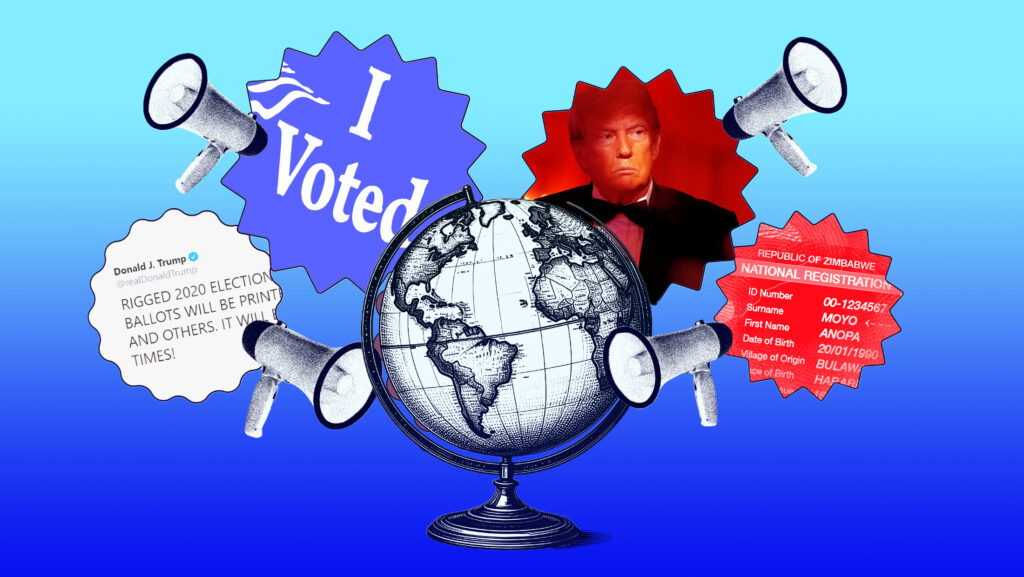Trump’s Voter Suppression Tactics Align U.S. With Overseas Dictators

In guidance issued July 17, Secretary of State Marco Rubio directed diplomatic missions to refrain from commenting on the fairness of elections unless there is a “clear and compelling U.S. foreign policy interest” to do so.
Democracy advocates fear that Rubio’s order, which ends the longstanding bipartisan support for promoting free and fair elections globally, will result in the United States only condemning electoral irregularities in countries ideologically opposed to the Trump administration, such as Venezuela and Nicaragua.
But with the 2026 and ‘28 elections approaching, the order could have troubling implications for American democracy, too.
The ongoing Republican attack on fair elections here in the U.S. has long been at odds with our commitment to promoting democracy abroad. By pulling us back from that commitment, Rubio’s directive removes that source of tension — potentially making it easier for the Trump administration as it works to rig the upcoming contests in favor of the GOP.
Indeed, what’s striking is that many of the most troubling voter suppression tactics that the U.S. will no longer condemn overseas — strict proof of citizenship and residency requirements, as well as purges of the voter rolls, all targeting disfavored groups — are being kicked into high gear here at home.
Take proof of citizenship requirements — a centerpiece of both the SAVE Act that passed the Republican-controlled House in April, and of President Donald Trump’s anti-voting executive order.
Last year, Ghana’s government required voters to obtain an identity card, which was nearly impossible for those lacking a both certificate to obtain, in order to register to vote.
That requirement was ultimately dropped amid domestic and international pressure, including from the United Nations, U.S. Embassy and American-funded civil society initiatives. But similar restrictions have in the past worked to disenfranchise African voters. In Côte d’Ivoire, the government required voters to show national identity cards to register for a pivotal election in 2010 — a bid to disenfranchise northern voters, who were subject to xenophobia and assumed to support the opposition. Obtaining the documents needed to get an identity card proved impossible for many. But, in another echo of our domestic politics, the government dismissed any criticism as coming from those who wanted foreigners to vote.
Proof of residency requirements have also played a key role in voter suppression efforts both in the U.S. and overseas.
Laws to tighten residency rules in recent years have worked to restrict access for students and young voters in states from New Hampshire to Montana.
They were also a key tactic that dictator Robert Mugabe used to exclude voters in Zimbabwe. There, accepted documents, including utility bills and land deeds, were inaccessible to the urban working class and youth who supported the opposition.
Similar dynamics persist in Zanzibar, a Tanzanian island and stronghold of opposition to the current government, where a residency attestation from a traditional authority aligned with the government is required for voter registration. Opposition supporters, who are disproportionately younger voters, routinely have their attestations denied on the grounds that they are not residents, preventing them from voting, and benefiting the ruling party.
Making it easier to purge voters is another voter suppression weapon used around the globe. In the U.S., Trump’s order aims to give states improved access to a government citizenship database, so that they can use it to cancel suspect voter registrations. And Congress held a hearing just this week aimed, essentially, at making the case that it’s currently too hard for election officials to remove voters from the rolls.
The voter suppression tactics used by the Trump administration are part of a broader global playbook.
And before the 2021 Zambian election, the incumbent government, facing a difficult re-election campaign, required voters to re-register by mandating fresh voter rolls under the guise of removing dead voters and duplicates. The result was fewer registrations in opposition strongholds, and entire areas were further disenfranchised. While widespread popular anger ensured an overwhelming opposition victory, this action, amongst others, made the election outcome highly uncertain until the very end. In fact, many observers believed that the scales were so tilted in favor of the incumbent that the opposition would be unable to win despite its widespread popularity. Ironically, after losing, the incumbent president at the time claimed the process was rigged, despite attempting to have done so for his own benefit- a phenomenon now commonplace amongst losing Republicans in the United States.
In Zimbabwe, meanwhile, updates to the voter rolls have in the past deregistered thousands of eligible voters likely to support the opposition.
In other words, the voter suppression tactics used by the Trump administration are part of a broader global playbook aimed at preventing voters — often those who are likely to support the opposition — from participating in elections, undermining the integrity of the democratic process.
Perhaps it’s no surprise, then, that the administration is unwilling to speak out about attacks on free and fair elections overseas. Given its own war on voting, maybe it recognizes how hollow its words would ring.
R. Maxwell Bone is a democracy and governance analyst and practitioner whose work spans grassroots and international organizations globally. His writing appears in Foreign Policy, The New Humanitarian, and other publications. He has served on international election observation missions in Nigeria and Mozambique. Twitter: @maxbone55 | Bluesky: @maxbone55.bsky.social.